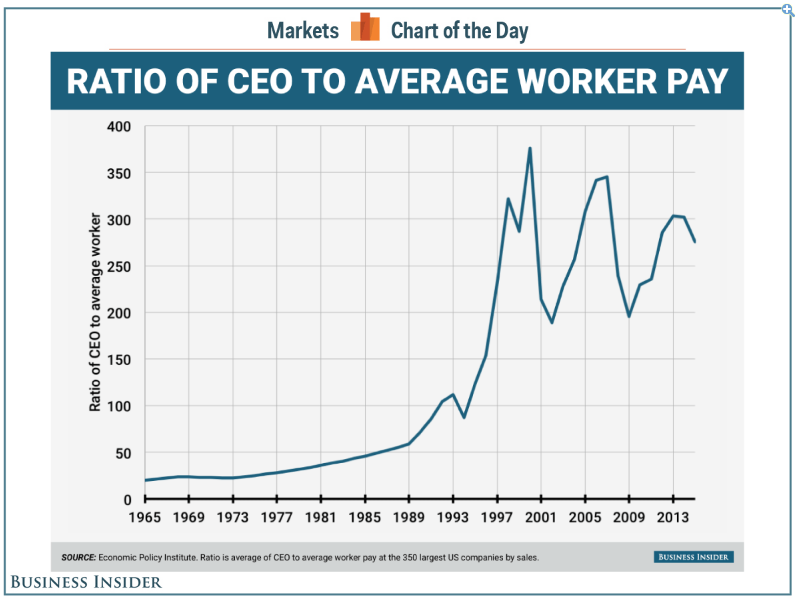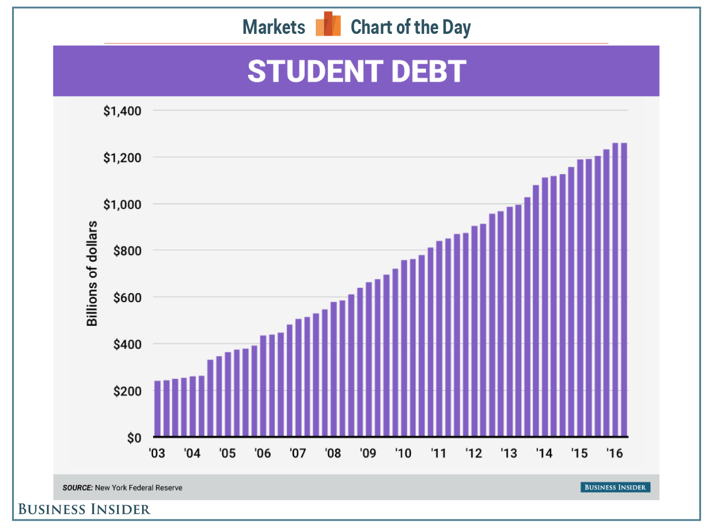Check out this chart from Business Insider:
 Basically, this chart is showing you how much more your CEO makes than the average worker at your company, assuming you work for one of the 350 largest companies in the United States.
Basically, this chart is showing you how much more your CEO makes than the average worker at your company, assuming you work for one of the 350 largest companies in the United States.
So, let’s put this into real numbers:
The average worker makes around: $45,000.
That means the CEO makes: $12,420,000.
I think most people feel that disparity is too much. I put it in the context of professional athletes. Should LeBron James get $33,000,000 per year to play basketball for the Cleveland Cavaliers?
We tend to think LeBron shouldn’t get paid $33 Million per year, but at the same time were alright with it because well he wins games. But somehow we don’t believe Indra Nooyi, the CEO of PepsiCo, should earn $22,000,000 per year like she did last year. Why is that?
Oh wait, would you feel better if I put one of those old white guy CEOs compensation number up? Would that make it easier for you to hate?
I find it interesting that for most of the modern era (prior to 1980) CEOs made roughly 25 times more than the average worker. In our example above that would then look like this:
Average worker: $45,000
CEO: $1,125,000
Yeah, this still sucks, right?
So, what should the figure be? How much more should a CEO make than the average worker? Does 10 times seem right ($450,000)?
I’m a Moneyball guy. I have a hard time believing any CEO is truly worth 276 times more than an average worker, but if that’s what the market bears, more power to them! I’m also a Capitalist!
I do believe, though, that all of these organizations could fire their CEOs at 276 times pay, hire someone else at half that pay and they would have the same or better results across the board. 50% pay cut, same performance. So, why wouldn’t they do this?
Organizational dynamics are built to continue this behavior of over-paying. At some point around 1980, someone let the cat out of the bag and leaders have been pushing the envelope ever since! Think about how this all goes down. A leader goes to the board of directors and says, “Look we need better talent at the C-level to support me.” The board supports, raises get put in, this pushes up against the CEO.
Well, now we have compression, time to move the CEO up. The cycle continues, again, and again…. It becomes a leadership arms race! The board feels like they are in no win situation. If the company is doing well, of course, they vote yes. If the company is doing bad, well, we need better, so you get another yes vote.
No one is willing to just stop it. To say, you know what, ten times or twenty-five times, is plenty. We’ll find great talent at that amount. I’ve met great CEOs and awful CEOs of very large companies. All made outrageous money and their performance had very little to do with their compensation.
What do you think? How much more should a CEO get paid over the average worker?


